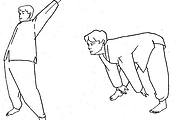
Nonwestern Adult Learning Theory & Four Korean Learning Disciplines
1. Korean Confucianism
2. Korean Buddhism
3. Sundoism
4. Dong-Hak
Orientalism in learning has reinforced the marginalization
and oppression of other learning systems of learning and knowing. Expansion of
our understandings about different learning system can enrich our meaning-making
processes, which can be beneficial for ourselves (Merriam, Caffarella, &
Baumgartner, 2007; Reagan, 2000).
In western paradigm,
learning is emphasis on cognition, cognitive development, knowledge,
information processing and intelligence measurement (Thorndike, Bregman,
Tilton, & Woodyard, 1928). Yet collective and
indigenous learning has dominated in non-western countries while rationalism
and individual learning are dominant in the western learning paradigm.
Merriam et al. (2007) introduce five non-western
learning principles: Confucianism; Hinduism; Maori concept; Islamic
perspective; and African indigenous education. The authors indicate that the
value of engaging and study non-western learning principles provide us
opportunities to challenge the think about the purpose of education and
learning as well as question the nature of knowledge production as well as
leading us to make new meanings.
In this session, I focus on four Korean learning principles
and introduce key concepts of each principle. The purpose of this in-depth
documentation is to understand a non-western nation specific learning
principles, and to make a sense of differences and commonalities of non-western
learning principles.
First, the Great learning is defined as it is to enlighten
the people’s (inborn) brightness; to refresh people’s warmth of body and mind
(virtue); to cease people from going a wrong way; and to reach people to the
ultimate goodness (Legge, 2009) [1]. In traditional
Confucianism, the great learning can be achieved through eight steps:
1)
investigation of things;
2) extension of knowledge;
3) sincerity of will;
4) rectification
of the mind;
5) cultivation of one’s personal life (body);
6) regulation of the
family;
7) regulation of the nation; and
8) accomplish world peach.
Different
from the western learning principles, Confucianism learning includes both the
individual and social, even the world, aspects of learning. Korean Confucianism
scholars had debated about conceptual world versus material world over four
hundred years. In early sixteenth century, many Korean scholars believed that a
conceptual discipline dominated material world then learning should be a
knowing process of the discipline.
But the theory was challenged that dynamics
of material world shaped a conceptual discipline rather than the discipline
formulated complex world. The debate inspired scholarly endeavors and
influenced socio-political system of Korea for more than three hundred years.
In the late nineteenth century, an innovative claim has emerged: only the
material world exists. Based on the belief of this, a group of scholars
insisted that only practical experience of material world is the real
learning. The key characteristic of
Korean Confucianism is that it does not limit ‘learning’ as individual
activities but treat the learning as a main driver of socio-cultural system
changes.
Second, Korean Buddhism is differentiated by its unique
inquiry based learning discipline from other Buddhist disciplines. For example,
a Buddhist monk gets an awkward question from his/her master. “Shoot the
Buddha?” is one of typical inquiries in Korean Buddhism. Korean monks address
those challenging inquires in their own meaning-making ways through their whole
lives.
Third, Sundoism is focusing on material world rather than
conceptual world. However, the material world what Sundoists believe is
composed of ‘unmaterializable energy or force – called Ki.’ (Kim, 2003). Learning is, then, the process
of practicing the energy.
Fourth, Dong-Hak is a uniqtue religion and epistemological
practice that was formulated and introduced in late nineteenth century in
Korea. Koreans suffered from colonialism attacks in the century, and a group of
people challenged the conventional Confucianism, Buddhism, and Sundoism
principles since they questioned these principles oppressed people rather than
emancipate them from external threats. Integrating traditional principles,
Dong-Hak sentenced a core value: respect human as the God. For Dong-Hak
followers, learning is viewed as the lifelong process of awakening and
cultivating internal Holy divine.
In conclusion, Korean have viewed the learning is the most
important thing to realize their beliefs and wants such as being a righteous
person, awakening, being a holy divine. However, these traditional non-western learning
principles are in risk of extinction for failing in self-modernization and late
industrialization. In addition, revival and revitalization of those traditional
learning principles is questioned in modern society. HRD and adult education
scholars may need to address the value of non-western learning principles to explore
new knowledge and understanding of purpose and methods of learning.
Reference
Kim, H. (2003). The Tao of Life. (Dissertation/Thesis,
Unpublished), Saybrook University.
Merriam, S. B., Caffarella, R.
S., & Baumgartner, L. (2007). Learning in adulthood a comprehensive guide The Jossey-Bass higher and adult education
series (pp. xvi, 533 p.). Retrieved
from http://www.library.uiuc.edu/proxy/go.php?url=http://www.credoreference.com/book/wileyla
'Meditative Leadership Development > Breathful Leadership' 카테고리의 다른 글
| 나잇값-매일 나잇수만큼 해야할 것들! (0) | 2022.08.02 |
|---|---|
| Leaders, please be breathful to build "Positive Mindset" for change! (0) | 2014.04.01 |
| 얼굴은 왜 얼굴인가 (Why Face is Face?) (0) | 2014.03.25 |
| How to Manage "Energy" for Work, not "Time"? (0) | 2014.02.16 |
| Nontraditional Adult Learning Theory and Practice. (0) | 2011.10.07 |




댓글